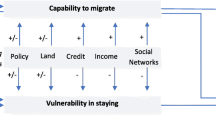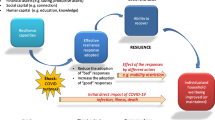Abstract
This paper discusses the applicability of crop insurance for the case of Malawi and explores the potential impact of climate change on the viability of the Malawi weather insurance program making use of scenarios of climate change-induced variations in rainfall patterns. The analysis is important from a methodological and policy perspective. By combining catastrophe insurance modeling with climate modeling, the methodology demonstrates the feasibility, albeit with large uncertainties, of estimating the effects of climate variability and climate change on the near- and long-term future of microinsurance schemes serving the poor. By providing a model-based estimate of insurance back-up capital necessary to avoid ruin under climate variability and climate change, along with the associated uncertainties and data limitations, this methodology can quantitatively demonstrate the need for financial assistance to protect micro-insurance pools against climate-induced insolvency. This is of major concern to donors, NGOs and others supporting these innovative systems, those actually at-risk and insurers providing insurance. A quantitative estimate of the additional burden that climate change imposes on weather insurance for poor regions is of interest to organizations funding adaptation. Further, by linking catastrophe modeling to regionalized climate modeling, the analysis identifies key modeling inputs necessary as well as important constraints. We end with a discussion of the opportunities and limits to similar modeling and weather predictability for Sub-Saharan Africa beyond the case of Malawi.







Similar content being viewed by others
Notes
Based on personal communication with H. Ibarra and World Bank (2005).
The following trigger events are set in the 2006 contracts: Upper reps. lower claim triggers (in mm) for each phase were for phase 1: 35 and 30, for phase 2: 35 and 30, and for phase 3 220 and 20.
Gamma distributions are standardly used for describing rainfall totals (see von Storch and Zwiers 1999)
References
Action Aid (2006) Climate change and smallholder farmers in Malawi: understanding poor people’s experiences in climate change adaptation. http://www.actionaid.org.uk/doc_lib/malawi_climate_change_report.pdf. Cited 1 Sep 2008
Bals C, Warner K, Butzengeiger S (2006) Insuring the uninsurable: design options for a climate change funding mechanism. Clim Pol 6:637–647
Bouwer LM, Vellinga P (2005) Some rationales for risk sharing and financing adaptation. Water Sci. Technol. 51:89–95
Cardenas V, Hochrainer S, Mechler R, Pflug G, Linnerooth-Bayer J (2007) Sovereign financial disaster risk management: the case of Mexico. Environ Hazards 7:40–53
Carter T, Jones R, Lu X, Bhadwal S, Conde C, Mearns L, O’Neill B, Rounsevell M, Zurek M (2007) New assessment methods and the characterisation of future conditions. In: Parry M, Canziani O, Palutikof J, van der Linden P, Hanson C (eds) Climate change 2007: Impacts, adaptation and vulnerability. Contribution of working group II to the fourth assessment report of the intergovernmental panel on climate change. Cambridge University Press, Cambridge, pp 133–171
Christensen JH, Hewitson B, Busuioc A, Chen A, Gao X, Held I, Jones R, Kolli RK, Kwon WT, Laprise R, Magaña RL, Mearns L, Menéndez CG, Räisänen J, Rinke A, Sarr A, Whetton P (2007) Regional climate projections. In: Solomon S, Qin D, Manning M, Chen Z, Marquis M, Averyt KB, Tignor M, Miller HL (eds) Climate change 2007: The physical science basis. contribution of working Group I to the fourth assessment report of the intergovernmental panel on climate change. Cambridge University Press, Cambridge, pp 847–940
Cohen M, Sebstad J (2003) Reducing vulnerability: The demand for microinsurance. MicroSave-Africa, Africa
Eeckhoudt L, Gollier C (1995) Risk-evaluation, management and sharing. Harvester Wheatsheaf, New York
Embrechts P, Klüppelberg C, Mikosch T (1997) Modeling extreme events. Springer, Berlin
Geman H (eds.) (1999) Insurance and weather derivatives: from exotic options to exotic underlyings. Risk Books, London
Hellmuth ME, Moorhead A, Thomson MC, Williams J (eds) (2007) Climate risk management in africa: learning from practice. International Research Institute for Climate and Society (IRI), Columbia University, New York
Hess U, Syroka H (2005) Weather-based insurance in Southern Africa. The case of Malawi. World Bank, Washington, D.C
Ho TSY (2005) Asset/liability management and enterprise risk management of an insurer. JOIM 3:45–59
Linnerooth-Bayer J, Mace MJ, Verheyen R (2003) Insurance-related actions and risk assessment in the context of the UNFCCC. Background paper for UNFCCC workshop on insurance-related actions and risk assessment in the framework of the UNFCCC, Bonn, 11–15 May 2003
Linnerooth-Bayer J, Mechler R, Pflug G (2005) Refocusing disaster aid. Science 309:1044–1046
Linnerooth-Bayer J, Mechler R (2007) Insurance against losses from natural disasters in developing countries. Background paper for United Nations World Economic and Social Survey 2008 (WESS).
Lowe SP, Stanard JN (1997) An integrated dynamic financial analysis and decision support system for a property catastrophe reinsurer. ASTIN Bulletin 27:339–371
Mearns LO, Rosenzweig C, Goldberg R (1997) Mean and variance change in climate scenarios: methods, agricultural applications, and measures of uncertainty. Clim Change 35:367–396
Mechler R (2004) Natural disaster risk management and financing disaster losses in developing countries. Verlag für Versicherungswirtschaft, Karlsruhe
Mechler R, Linnerooth-Bayer J, Peppiatt D (2006) Microinsurance for natural disasters in developing countries: benefits, limitations and viability. ProVention Consortium, Geneva
Met Office (2007) Types of climate models: http://www.metoffice.gov.uk/research/hadleycentre/models/modeltypes.html. Cited 1 Sep 2008
MVAC—Malawi vulnerability assessment committee (2005) Provisional results of the harvest outcome analysis. Lilongwe, Malawi
Mills E (2005) Insurance in a climate of change. Science 308:1040–1044
Müller B (2002) Equity in climate change: The great divide. Oxford institute for energy studies. Oxford, United Kingdom
Nakicenovic N, Swart R (eds) (2001) Special report on emissions scenarios (SRES). Special report of the intergovernmental panel on climate change (IPCC). Cambridge University Press, Cambridge
Osgood D, Warren D (2007) Drought insurance in Malawi. In: Hellmuth ME, Moorhead A, Thomson MC, Williams J (eds) Climate risk management in Africa: Learning from practice international research institute for climate and society (IRI). Columbia University, New York
Skoet J, Stamoulis K (2006) The state of food insecurity in the world, 2006: Eradicating world hunger-taking stock 10 years after the world food summit. Food and Agriculture Organization of the United Nations, Rome
Solomon S, Qin D, Manning M, Alley RB, Berntsen T, Bindoff NL, Chen Z, Chidthaisong A, Gregory JM, Hegerl GC, Heimann M, Hewitson B, Hoskins BJ, Joos F, Jouzel J, Kattsov V, Lohmann U, Matsuno T, Molina M, Nicholls N, Overpeck J, Raga G, Ramaswamy V, Ren J, Rusticucci M, Somerville R, Stocker TF, Whetton P, Wood RA, Wratt D (2007) Technical summary. In: Solomon S, Qin D, Manning M, Chen Z, Marquis M, Averyt KB, Tignor M, Miller HL (eds) Climate change 2007: The physical science basis. Contribution of working Group I to the fourth assessment report of the intergovernmental panel on climate change. . Cambridge University Press, Cambridge, pp 19–91
Suarez P, Osgood DE, Hansen J, Carriquiry M, Mishra A (2008) Integrating seasonal forecasts and insurance for adaptation among subsistence farmers: The case of Malawi. Policy research working paper 4651. World Bank, Washington D.C.
Syroka J (2007) Insurance for farmers: Lessons learnt from India and Malawi. Presentation presented at the innovative finance meeting, New York, 18th October 2007. http://www.un.org/esa/sustdev/sdissues/finance/egm2007/presentations/syroka.pdf. Cited 1 Sep 2008
Tadross MA (2006) Evidence of a changing climate in Malawi, Mozambique and Zambia: Analysis of daily rainfall data and regional models. Report for project “institutions for climate change adaptation”. Development Economics Research Group, Infrastructure and Environment Unit, World Bank, Washington D.C.
Tadross MA, Jack C, Hewitson BC (2005) On RCM-based projections of change in southern African summer climate. Geophys Res Lett 32:L22713
United Nations Framework Convention On Climate Change (UNFCCC) Secretariat (2007) Decision-/CP.13, Bali action plan, Bonn
von Storch H, Zwiers FW (1999) Statistical analysis in climate research. Cambridge University Press, Cambridge
World Bank (2005) Managing agricultural production risk. World Bank, Washington D.C.
Acknowledgments
Financial support under a grant from the Bank-Netherlands Partnership Program for the project “Institutions for Climate Change Adaptation” of the World Bank’s Development Research Group is gratefully acknowledged. We thank Alexander Lotsch for comments provided and project management, as well as Pablo Suarez and Joanne Bayer for comments received.
Author information
Authors and Affiliations
Corresponding author
Rights and permissions
About this article
Cite this article
Hochrainer, S., Mechler, R. & Pflug, G. Climate change and financial adaptation in Africa. Investigating the impact of climate change on the robustness of index-based microinsurance in Malawi. Mitig Adapt Strateg Glob Change 14, 231–250 (2009). https://doi.org/10.1007/s11027-008-9162-5
Received:
Accepted:
Published:
Issue Date:
DOI: https://doi.org/10.1007/s11027-008-9162-5




